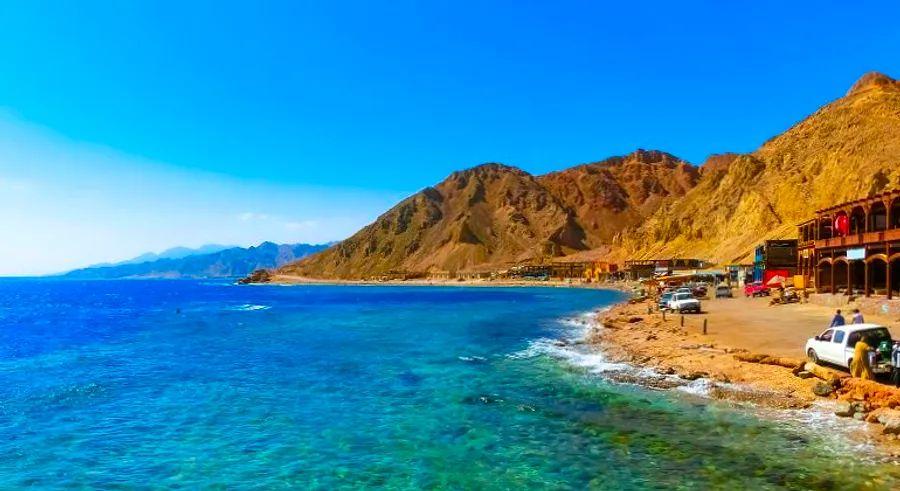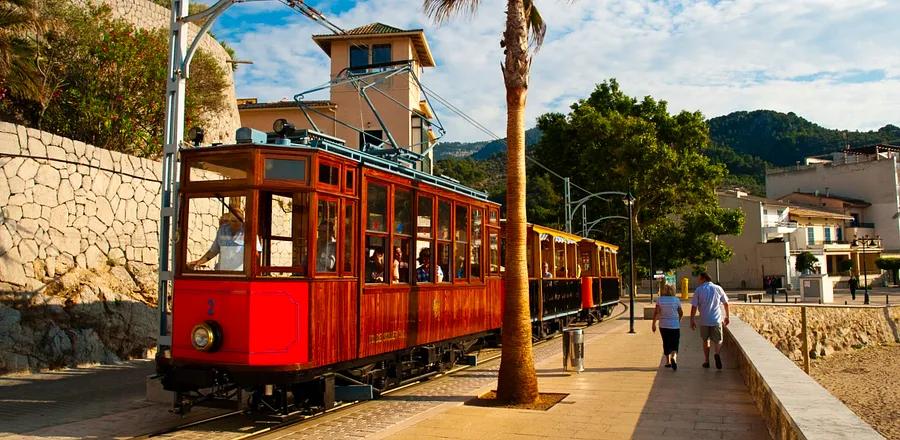Why Dahab is the ultimate Red Sea resort in Egypt

Tucked beneath Egypt's Sinai mountains, Dahab is a place so enchanting that many visitors decide to settle here after their first visit.
Once a quiet Bedouin fishing village, Dahab has evolved into one of the top diving spots on the Red Sea, attracting adventurers, nature enthusiasts, and more recently, domestic tourists looking to escape the effects of Covid-19.
Just an hour's drive from Sharm El Sheikh, Dahab offers a vibrant mix of activities, yet still maintains a relaxed, stress-free vibe where guests can unwind and soak in the stunning shades of blue in its waters.
This year-round haven features a lively boardwalk lined with budget-friendly hotels, tour operators, craft shops, and diverse eateries, each offering a unique atmosphere for visitors to enjoy.
Dahab's lively, diverse community is a blend of local Bedouins, Egyptians from the mainland, and expats from all over the world, each drawn to its natural beauty and proximity to Sinai’s many attractions.
As Julia Limonova, a Russian expat who relocated to Dahab three years ago, puts it: 'You really feel at home here. It's easy to find your tribe, with so many different people—free divers, divers, kite surfers, windsurfers, and yogis.'
'And you'll meet people from all over the world—Russians, Ukrainians, Germans, Italians,' she adds.
Dahab is one of the few places in the region with reliable internet, making it an appealing destination for remote workers seeking a tranquil seaside 'office.'
Following the first Covid-19 case reported in Egypt in March, the government imposed widespread restrictions, closing cafes and airports, enforcing curfews, and urging people to stay home.
Social distancing can be challenging in bustling cities like Cairo, which is why some have opted to relocate to Dahab during the pandemic.
As of this writing, there are no confirmed Covid-19 cases in Dahab, though this may be due to the town’s small size and lack of widespread testing.
'No one is talking about the coronavirus here. In Cairo, you’re constantly overwhelmed with news,' says Rahma Zein, who decided to quarantine in Dahab after friends recommended it.
'It really takes a toll on your mental health, and I believe when your mind is stressed, your immunity weakens.'
'Being here, away from the constant talk of the pandemic, helps you simply exist and restores a sense of normalcy.'
According to Zein, Dahab’s wide range of activities—like free diving, hiking, and sunbathing—make it the perfect spot for quarantining during these uncertain times.
'A typical day for me includes waking up, making breakfast, going for a free dive, relaxing on the beach, taking a hike, eating, and then going to bed,' she explains.
'In between, I catch up on work and make phone calls.'
The Blue Hole

The Blue Hole, one of Dahab’s most iconic spots, is often dubbed the deadliest diving location on Earth.
However, its notorious reputation only adds to the allure for daring divers seeking an underwater challenge akin to scaling Mount Everest.
Reaching a maximum depth of 328 feet and easily accessible from the shore, the Blue Hole is sheltered from strong currents, offering calm waters for divers.
The ideal conditions here attract free divers eager to improve their skills, as well as experienced divers seeking to test their limits in a competition with depth and breath capacity.
While scuba diving in the Blue Hole is generally safe, its notorious reputation comes from a treacherous archway called the Arch, which links the site to the open sea.
Scuba divers who explore the Arch, located 184 feet below the surface, risk narcosis, disorientation, and, in extreme cases, running out of air.
The growing popularity of the diving site has unfortunately accelerated the damage to its fragile marine ecosystem over the years.
To help reduce the impact of heavy traffic, a group of local divers has created an underwater museum featuring massive sculptures made from recycled materials, turning it into an artificial reef.
Among the most impressive pieces is a life-sized elephant sculpture weighing 700 kilograms, which has attracted countless tourists in search of a unique underwater adventure.
Diving through all of Dahab’s submerged sites in a single week would be nearly impossible due to the sheer number of standout spots, from vibrant reefs to the remarkably well-preserved S.S. Thistlegorm.
This British Merchant Navy ship, struck by a German bomber during World War II, offers a rare underwater peek into history.
For those who prefer shallower waters or wish to avoid crowded dive sites, there are endless snorkeling opportunities to explore.
Travelers can trek to Ras Abu Galum National Protectorate, either on foot or by camel, where 400 square kilometers of untouched coastline reveal pristine coral reefs and marine life.
For a colorful underwater experience, the Three Pools dive site in nearby Akaba is a great choice, with its vibrant fish and beautiful surroundings.
The Blue Lagoon and Wadi Qnai

With its calm turquoise waters and consistent winds, the Blue Lagoon offers a peaceful escape with just the right amount of speed for windsurfers and ample airtime for kitesurfers.
The area is sparsely developed with only a few bamboo huts, and usually just a small number of people, giving it an exclusive, tranquil beach vibe.
The lagoon has no intention of catering to tourists with resort-style hotels or luxury amenities.
There’s no internet, no phone service, and minimal electricity, making it the perfect place to disconnect from the modern world.
Visitors are drawn to its unpretentious beauty, and if hunger strikes, local Bedouins are ready to catch and prepare some of the freshest seafood you’ll ever taste.
Many choose to camp overnight to witness the breathtaking sunrise and sunset.
While you can rent a hut or bring a tent, it's not necessary—just a sleeping bag on the sandy beach is enough to lay back and watch the stars unfold across the sky.
While Dahab’s rise as a global hotspot is largely due to its diving and surfing, rock climbing has also gained immense popularity, with new routes being added every year.
The most popular climbing destination is Wadi Qnai, which offers routes for climbers of all abilities, including both single-pitch and multi-pitch options.
The valley’s sandy terrain, dotted with large granite boulders, is perfect for bouldering in the cool shade.
While daytime temperatures in summer make climbing impractical, many climbers opt to camp overnight and climb at sunrise, before heading back to town to cool off in the sea.
Just outside Dahab, there are several must-see attractions, including St. Catherine’s town, home to the world’s oldest Christian monastery, and Mount Sinai, where Moses received the Ten Commandments according to the Book of Exodus.
Another top hiking destination in the Sinai region is Jebel Makharum, also known as the 'Mountain with the Hole,' located between Dahab and St. Catherine.
Dahab during Covid-19

Dahab’s unique blend of versatility and seclusion is one of the reasons why people like Zein and Limonova have chosen to stay here during the coronavirus pandemic.
“Social distancing is much easier here,” says Zein. “You’re in the mountains, and when you go out, you’re on your own.”
While the influx of Egyptians moving from the cities to Dahab may temporarily boost the local economy, it also raises the risk of bringing the virus with them.
The Egyptian Health Ministry reports nearly 40,000 Covid-19 cases across the country, with Cairo and the neighboring provinces of Giza and Qalioubiya seeing the highest numbers.
“People are coming to Dahab from Cairo because it’s a safe place and they have time on their hands,” adds Limonova.
“But some residents of Dahab are opposed to it because we don’t have enough medical resources if something goes wrong,” she says.
To prevent a potential outbreak in Dahab, the government halted travel from Cairo, while beaches, cafes, and diving centers were closed, giving the local marine ecosystem a much-needed reprieve.
However, these restrictions are expected to be lifted in the coming weeks.
If Dahab can avoid an outbreak, it will be in an excellent position to recover when tourism returns, especially given the lack of congestion here.
With many affordable accommodations untouched by Covid-19 and plenty of remote areas to discover, it’s likely that this once-sleepy fishing town’s appeal will only grow once Egypt reopens its borders.

1

2

3

4

5
Evaluation :
5/5